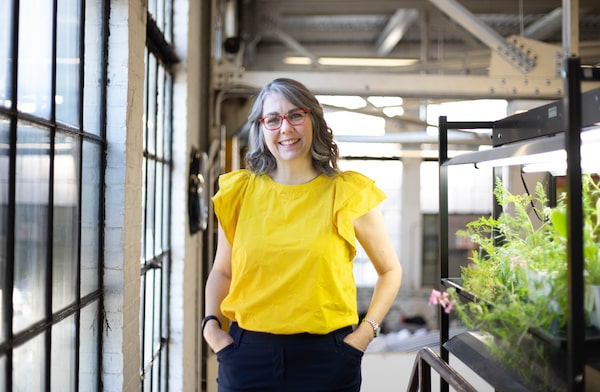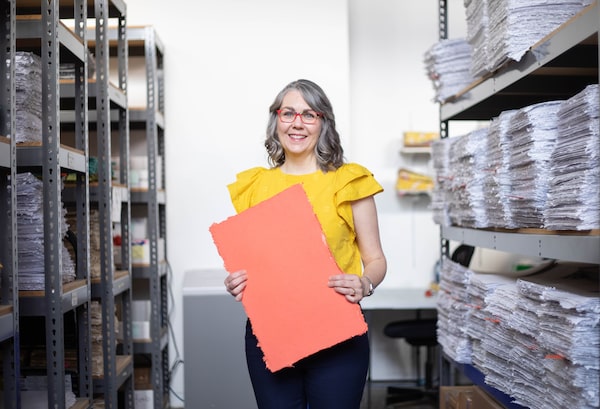
Sales for Botanical Paperworks have never been better, despite the obvious challenges of the pandemic, says CEO Heidi Reimer-Epp.Jessica Lee/The Globe and Mail
Botanical Paperworks has been reaping profits for two decades as customers worldwide opt to sow seeds embedded in the Winnipeg-based company’s handmade paper products.
Sales have never been better, despite the obvious challenges of the past two years.
“The pandemic proved our strategy of diversification across markets outside Canada,” says Heidi Reimer-Epp, chief executive officer of the company, which she founded with her mother in the mid-1990s and now has about 35 employees.
“We were able to maintain sales throughout COVID – with sales in one jurisdiction rising as cases fell, offsetting sales falling in another [areas] as it was hit by a wave of cases.”
The pandemic has been undoubtedly challenging for Canadian small businesses, but exporters such as Botanical Paperworks have faced additional complexities, especially with international travel restrictions. Federal government data found that, early in the pandemic, the number of small and medium-sized enterprise (SME) exporters fell by 16 per cent in April, 2020 from a month earlier.
This group quickly rebounded by July, 2020, to about 4-per-cent below pre-pandemic levels, while the value of their exports exceeded February, 2020 levels by 6 per cent.
Challenges remain, as a Global Affairs Canada trade report for January of this year noted: It found exports fell almost 9 per cent from the same month in 2021, largely due to renewed restrictions for travel from the Omicron variant and continuing supply chain bottlenecks.
Botanical Paperworks is focused on keeping up with demand as orders surge for its wedding and other special-occasion stationery, along with product lines that include cosmetic packaging, Ms. Reimer-Epp says. “We’re seeing growth everywhere now.”
The company, which manufactures in Winnipeg and sells its products online and to distributors in the U.S. and Europe, has by no means been on a fast track to success. The business has been making handmade paper from discarded product since the 1990s, before the advent of most recycling programs.
Then demand for its artisanal wedding stationary took off and it quickly became a small exporter after U.S. customers discovered its products online in the early days of e-commerce. It wasn’t until the mid-2000s – when it pioneered handmade paper embedded with wildflower, herb and vegetable seeds so the paper could be planted in gardens instead of recycled – that Botanical Paperworks found its niche.
“When we came up with the seed paper idea, we were like, ‘Would this actually work?’”
Ms. Reimer-Epp says three years of research and development helped ensure it could bring a repeatable product to market with seeds that would germinate. “Soon after, sales of seed paper outstripped all others, so we focused on it exclusively.”
Although the U.S. was a key, growing market, Botanical Paperworks still sought to boost its export game about five years ago when it enrolled in a new exporter accelerator program run by World Trade Centre Winnipeg, a global network of more than 300 organizations that help small companies enter new markets.
“We went into it with a specific region in mind to create a plan that we could replicate in other export markets,” Ms. Reimer-Epp says. She notes exporting rules were becoming increasingly complex, particularly for sending seeds to other nations concerned about invasive species.

Botanical Paperworks is focused on keeping up with demand as orders surge for its wedding and other special-occasion stationery, says Ms. Reimer-Epp.Jessica Lee/The Globe and Mail
The World Trade Centre Winnipeg program, launched in 2017, has helped more than 90 SMEs navigate the complexities of international trade law, taxation and distribution chains. “The program goal is really focused on helping companies create an export plan,” says Camille Bardy, project manager at World Trade Centre Winnipeg.
“So, let’s say they want to go to the U.S. We review their plan, and they meet with our expert partners to validate their strategy.”
Most participating companies have about $1-million in revenue and already are exporting, like Botanical Paperworks, Ms. Bardy adds. “But many have made costly mistakes.”
Ms. Bardy cites one company that partnered with a distributor overseas, which went bankrupt before paying for its shipment. Only after taking the accelerator program did the local firm realize Export Development Canada, an accelerator program partner, offers insurance for this eventuality, Ms. Bardy says.
“They could have avoided that situation altogether had they taken the program first,” she says.
In the case of Botanical Paperworks, the accelerator helped it develop an export plan for Germany, now a key market for the firm. The accelerator program was a learning experience for Ms. Reimer-Epp, though not so much in revealing what the company had been doing wrong. Rather, she says it validated many of its existing processes.
“It was interesting in that I did not come away thinking, ‘Oh man, we are such a disaster and made all these mistakes,’” she says.
Botanical Paperworks built a better, more systematic export plan it could adapt quickly for new markets. As a result, it had already cultivated new export markets before the pandemic struck, so revenues continued to bloom.
“We had a really strong 2020 and 2021 sales,” Ms. Reimer-Epp says. “We have been posting growth for almost the whole 25 years of our existence, largely thanks to our export plans – and those last two years were no exception.”